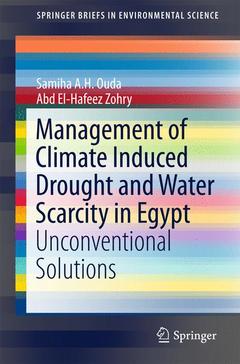Description
Management of Climate Induced Drought and Water Scarcity in Egypt, 1st ed. 2016
Unconventional Solutions
SpringerBriefs in Environmental Science Series
Authors: Ouda Samiha A.H., Zohry Abd El-Hafeez
Language: English
Subjects for Management of Climate Induced Drought and Water Scarcity...:
Keywords
Climate Change; RCP6.0 from CCSM4 Model; Rain Fed Agriculture; Field and Fruit Crops; Irrigated Agriculture; Changing Crops Sequence; Intercropping; Irrigation Water Saving Under Surface Irrigation; Crops Structure Under Climate Change; WRF-RCM Regional Climate Model; Management of Salt-affected Soil; Crop Rotations in Salt-affected Soil; climate change impacts; water policy; meteorology
52.74 €
In Print (Delivery period: 15 days).
Add to cartSupport: Print on demand
Description
/li>Contents
/li>Biography
/li>Comment
/li>




